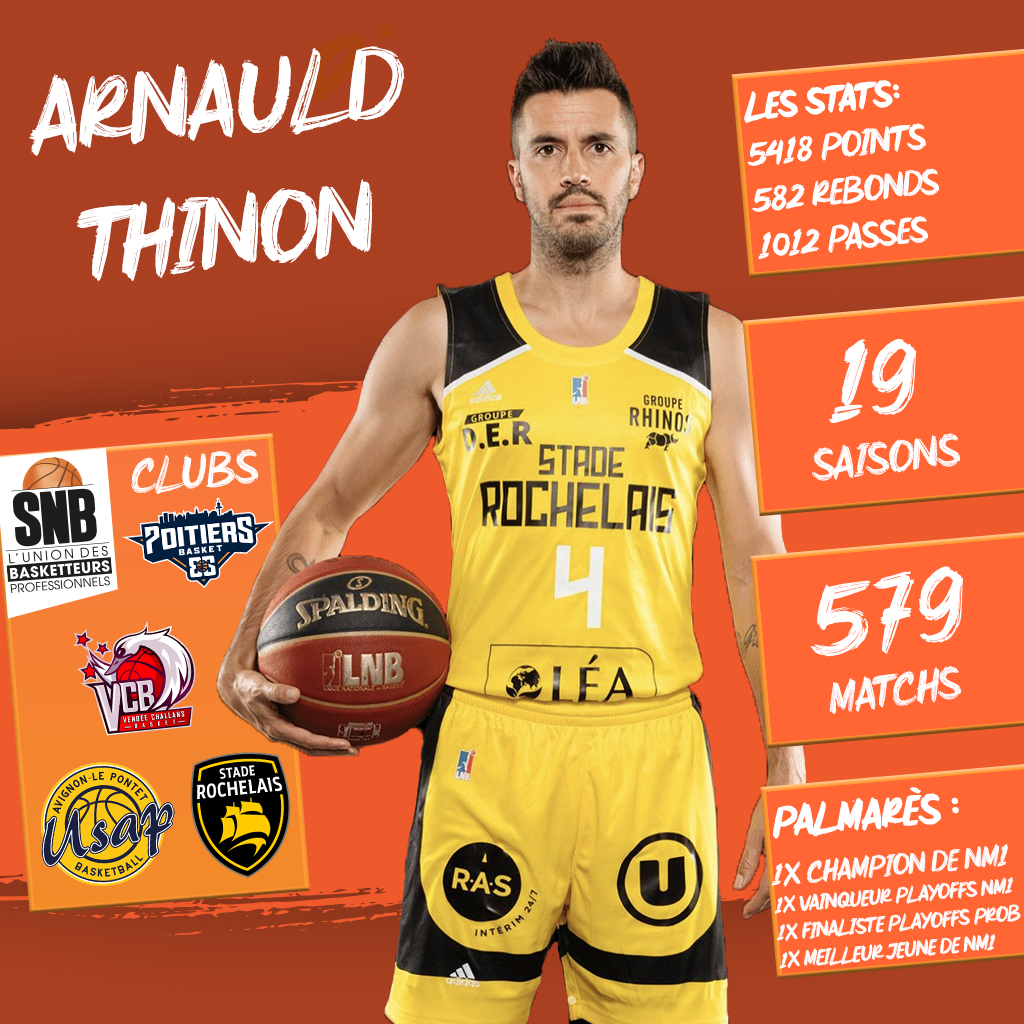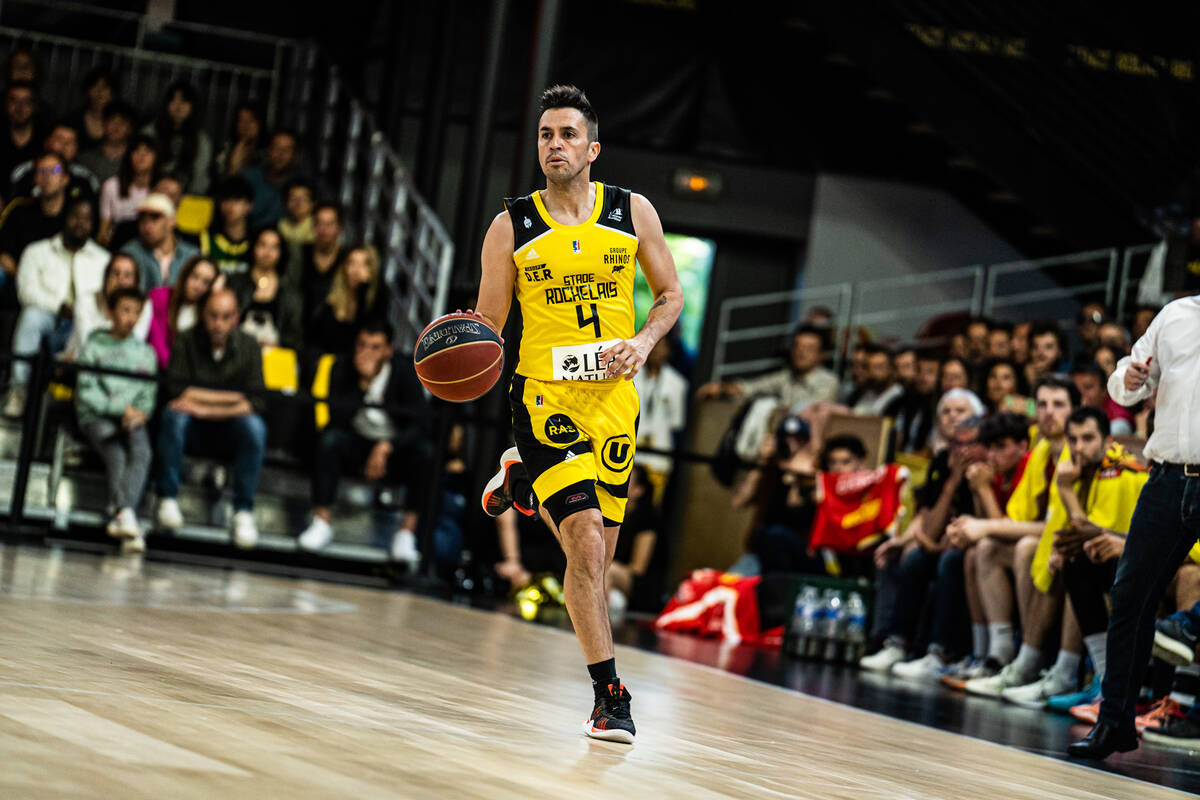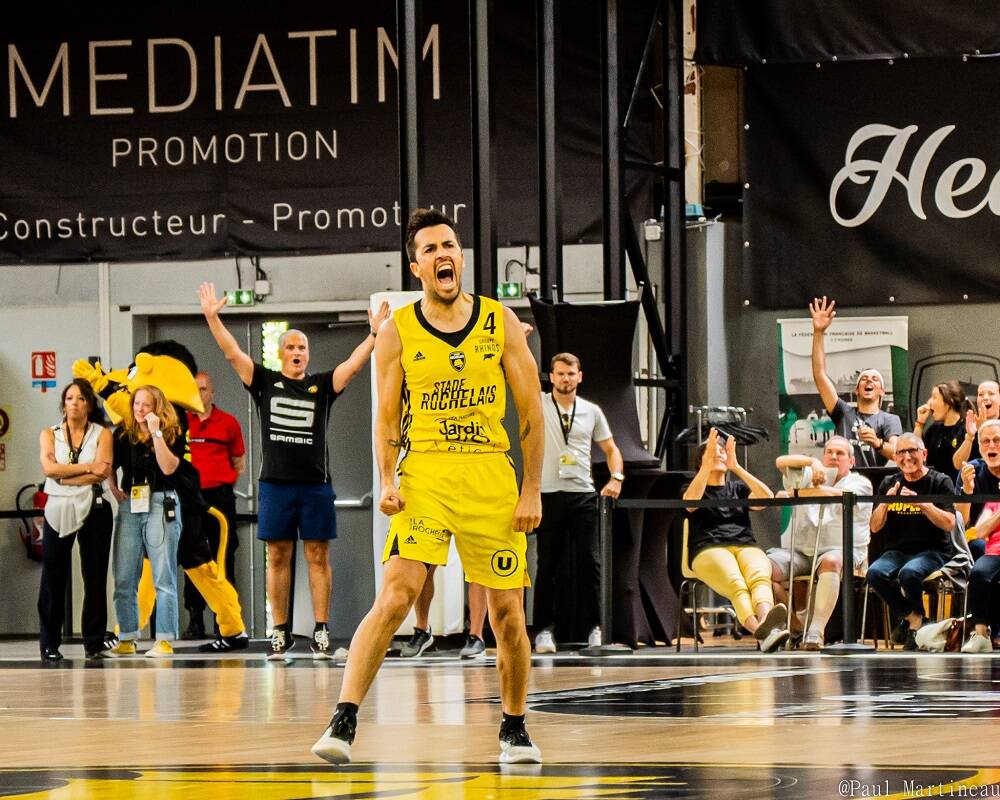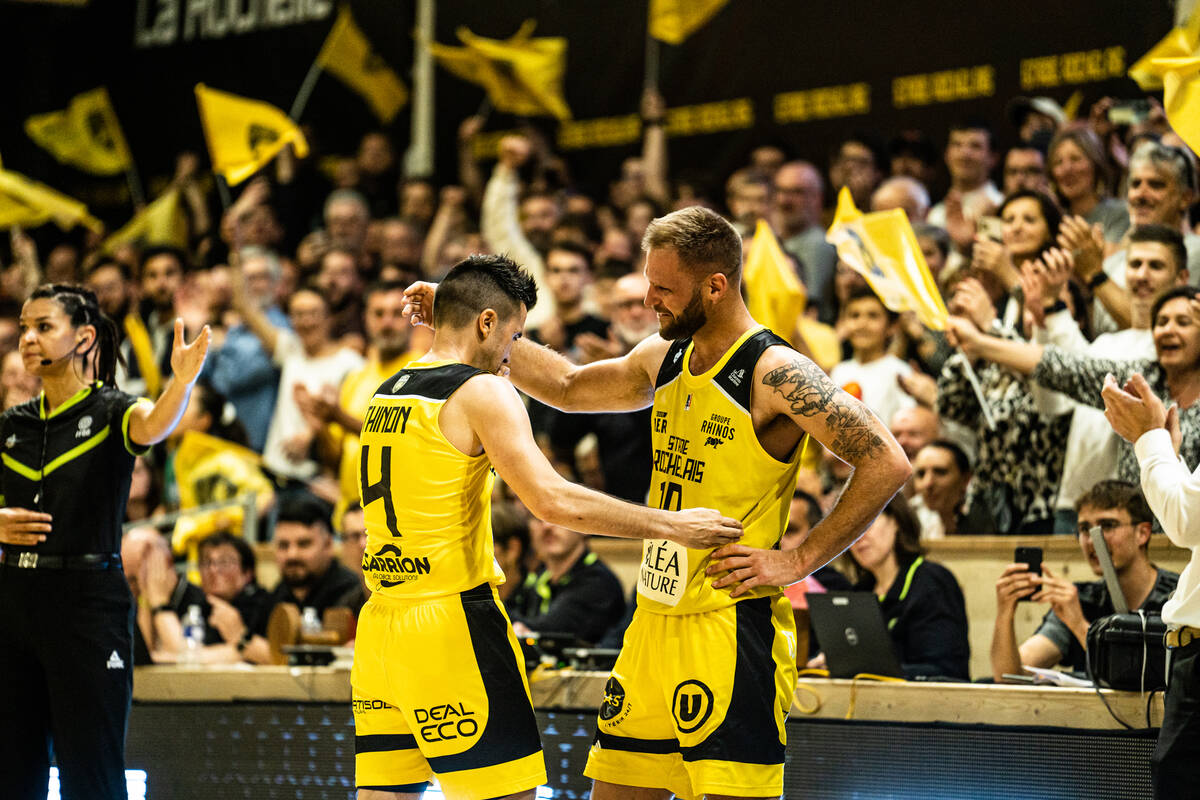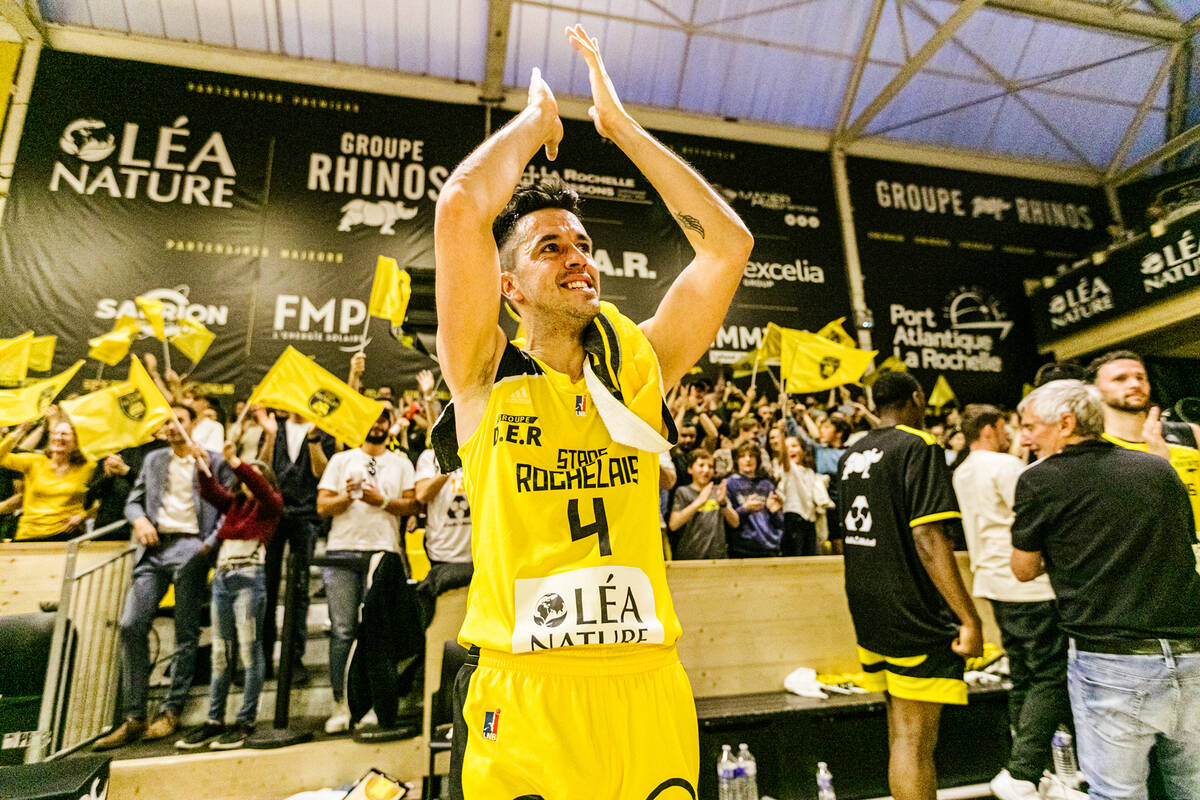It was announced Arnauld Thinon retired as a professional player at the end of this season with Stade Rochelais. The season ended on a high note, as Arnauld, captain of La Rochelle, and his team secured their place in the Pro b, a first in the club’s history.
Arnauld is retiring after 19 professional seasons between NM1 and ProB, 4 different clubs and 528 games played.
He agreed to talk about this last season and his future position as “Head of Basketball Operations” at Stade Rochelais.
Hi Arnauld,
How are you? Have you been able to get some rest after announcing your retirement?
I’m feeling good, so no worries there (laughs)! I didn’t have to worry about injuries towards the end of the season, which was pretty cool because I was determined to finish the season on the pitch.
But I didn’t necessarily get much rest (laughs) because I went straight back to work with the Stade Rochelais staff.
I did have a few days’ rest, though, and Aymeric was very nice to me about that.
After that, it was a very good thing to move on, because the transition with Pierrick, his previous assistant, had to go as smoothly as possible. I’m sure we’ll come back to this in your next questions, but as I’ll be taking over most of the tasks he was in charge of, it was important for him to brief me before he left.
As I’m going to be part of the staff, I was bound to be present at recruitment and logistics meetings, and in the end things came together naturally.
I was still a player until the end of June and I couldn’t see myself arriving at the beginning of July saying “Hi guys, I haven’t prepared anything and I don’t know anything, but let’s go!
Yes, it’s better to arrive prepared (laughs).
Especially as you’re just coming off a long season that’s been very special.
Yes, it’s been a very frustrating season for me with all the injuries and relapses. It was complicated not to be able to help the team.
We won the title on the pitch last year, and that was just incredible.
So the objective that Aymeric and I had set ourselves was to spend as much time as possible on the pitch in my final season, so as to help the team stay up.
Despite a complicated start, things turned out really well and I really enjoyed the games and training sessions.
In the end, we managed to stay up with 3 games to go, so our objective was achieved.
I imagine it must have been a source of great pride for you to have succeeded in this project…
I arrived at La Rochelles 4 years ago with the project of taking the club up to Pro B and keeping it there. Some people looked at me and thought I was crazy (laughs).
But I felt that the stadium project in La Rochelle was very well constructed, and that inspired me, and today we’re there!
So, yes, there’s a certain pride in having made it to the end, especially as some people didn’t necessarily believe in it.
Stade Rochelais is also the first club to obtain the LNB label in its first year in ProB. When you signed, did you know that the club had big ambitions?
I’ll be honest, when I arrived the first year, I was a bit scared. The infrastructure was there, but the team we had wasn’t necessarily at the level I was expecting.
I think what changed everything was Aymeric’s arrival. The stadium had its objectives, but he made them concrete thanks to his knowledge of the game and basketball in general.
He helped the club to become more structured and professional. It’s something that already existed in rugby, but not yet in basketball.
Anyway, I’ve been telling everyone here for the last 4 years that the best recruit at Stade Rochelais is Aymeric Janneau (Laughs).
It was a great last challenge for you.
Have you been able to take a step back from your career, particularly during this last year?
Knowing that this was going to be my last season really helped me with that.
Honestly, I’m pretty proud of what I’ve achieved. Nobody predicted a future for me in basketball, but I clung to this dream of being a professional, and even though it might not have worked out, I got there.
So you’re going to be assisting Aymeric, who we know well at the SNB since he was once President! (Laughs)
What exactly are your duties going to be?
Exactly! The exact job is “Basketball Operations Manager”.
So I’m going to be in charge of logistics for the pros, as well as our future training center. In concrete terms, at the moment I’m involved, for example, in looking for apartments, welcoming new players and helping some of them to leave.
I’m also part of the recruitment team.
As far as my day-to-day tasks are concerned, I think I’ll be talking a lot with the staff and dealing with the various issues on a day-to-day basis.
The aim was also to take advantage of the fact that I’ve just stopped to get closer to the pitch and the players, especially as I still know most of them. But not everything has been decided yet, the aim being to share the workload, especially with Aymeric.
And do you think that, as a former player, you’ll be able to approach this position in a different way?
For me, this is where I can really bring my vision of things to the position. The fact that I was still a player last year means I know what the guys want, but I’m also a real conduit of information between the staff and the team.
I know their needs and desires, but also the things they can abuse (laughs), so it goes both ways.
In any case, bringing my own vision to the job is one of the reasons why I decided to take it on.
It’s also rewarding to be able to contribute and pass on what you’ve learned.
How did this project materialize for you? It was part of the plan when I signed for Stade Rochelais.
It all started with a discussion with Aymeric two years ago.
We were discussing my re-signing as a player, and the discussion turned to the idea of continuing to work together even after my career was over. I was immediately impressed.
And that’s when we started talking about training, because it was necessary after all (laughs).
We were in the NM1 at the time, so we started looking at training courses, and that’s when I signed up for the DU de directeur sportif via the SCB (Syndicat des coachs) in Grenoble, which I did at the same time as last season.
Aymeric accepted right away, even though it meant missing two days of training a month. In the end, I got my DU at the same time as the ProB promotion with the stadium. It was a busy end to the year! (Laughs)
How did you deal with the staff and your team-mates on this subject?
As far as the staff were concerned, we didn’t talk much about it in the end, since Aymeric was the one who handled those discussions with them.
As far as the players were concerned, I spoke mainly to Gaëtan (Clerc), and the others completely understood.
At the same time, I was leaving for my training and I had the club’s approval, so from that point on, no one ever expressed the slightest doubt.
I’d even go so far as to say that they were quite happy for me to leave because I was often in training on Mondays and Tuesdays, which meant that on Wednesdays I always brought breakfast to the morning training session to make up for not being there (laughs).
So you bought their silence with pastries?
That’s exactly it! (Laughs)
I get the impression that it can sometimes be a sensitive subject in some locker rooms, don’t you?
I think it really depends on the players, but it’s true that some find it hard to talk about the aftermath. I think deep down it scares us all a bit (laughs).
But I think that over the last few years, we’ve been talking about it a lot more, and I have to say that the SNB helps a lot with that, especially when it comes to talking about the aftermath and the training courses you can take during your career.
As far as I’m concerned, people are really speaking out on this subject. I really have the feeling that people are talking about it a lot more than at the start of my career.
To give you an example, I passed my DU at the stadium last season. Gaëtan is about to graduate from EM Lyon, Victor Diallo is in a Bachelor’s program at a business school and Jérôme Sanchez is about to start training too.
I think it’s great that today’s players can train during their career, even if it’s true that you have to hang in there and be well organized!
This year, I had a discussion about this with the hopefuls at the stadium. Inevitably, they told me they only wanted to play basketball. They didn’t realize how lucky they were to have access to education during their careers.
As far as I’m concerned, it’s at that age that they should be looking at their studies, because I’ve seen how complicated it is to go back to it later on, with a family and a career on track.
Unfortunately, it’s not always easy to make them understand.
It’s clearly one of our biggest challenges at the SNB.
You were talking about family. What role did yours play in your training project?
I’m lucky enough to have a wife who accepts a lot of things and manages a lot too.
We discussed it together and it really wasn’t an easy time because we have two children, but there was also my season, the house we were building and on top of all that, my degree.
But she understood that it was for my future and supported me 100%. She managed a lot of things so that I could look forward to my studies and my season as serenely as possible, and for that I’m very grateful. I have to admit that Amandine has been really great.
It’s great that you’ve had so much support. Hence the importance of your entourage in managing your career!
Getting back to your professional environment, you’ve been able to experience the proximity of the Stade Rochelais rugby club. How do you see such a structure, and what difference in terms of professionalism have you noticed?
The first thing that stands out is the difference in staffing levels, both sporting and administrative.
On the sporting side, for example, you have a general manager, a sporting director, a manager for the pro team, specific trainers for each phase of the game… It’s as if we had a coach in basketball, a trainer for the point guards, then one for the backs and another for the inside, or a trainer for the attack and another for the defense.
In basketball, clubs are structuring themselves, but we’re still a long way from all that.
I think that most of the work on structuring clubs will therefore have to be done on the staffs.
Then, I think that improving infrastructures will also be essential.
In rugby, they have everything on site. The training center, which they make available to us, contains everything that can enhance players’ performance, whether medical, sporting or well-being-related.
For example, they have the capacity to send echoes directly to their medical center without having to go through a clinic or anything else.
It’s interesting because these days we talk a lot about comparisons between France and other countries, particularly when it comes to training young talent, and one of the subjects that comes up most often is the differences in staff and infrastructure around their projects.
To give you an example, this year via rugby I was able to access their physical trainer, who is only dedicated to the injured and those returning from injury. So they have physical trainers for everything (laughs) and they have a lot more injured people to deal with than we do, but it’s still exceptional!
That’s for sure, especially coming from basketball, where for a very long time it was difficult to have a trainer dedicated to the professional group!
To conclude this interview, is there anything in particular you’d like to talk about or pass on?
Look, we’ve already talked about it, but I’d like to stress the importance of training as early as possible.
If young people can do this as early as the hopeful years, it can only be beneficial, it will be easier and it will enable them to look to the future much more serenely.
Taking over at 30 with a family is possible, but it’s much more complicated to manage.
It’s up to us to spread the word to these young players so that they realize this as quickly as possible!
Thank you for this exchange Arnauld, I’ll let you get on with it and wish you, on behalf of the SNB team, every success in your future project.
See you soon in La Rochelle!
📸 Stade Rochelais
